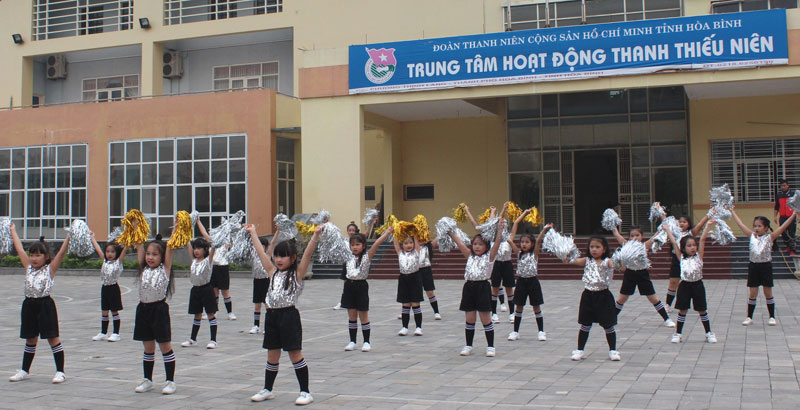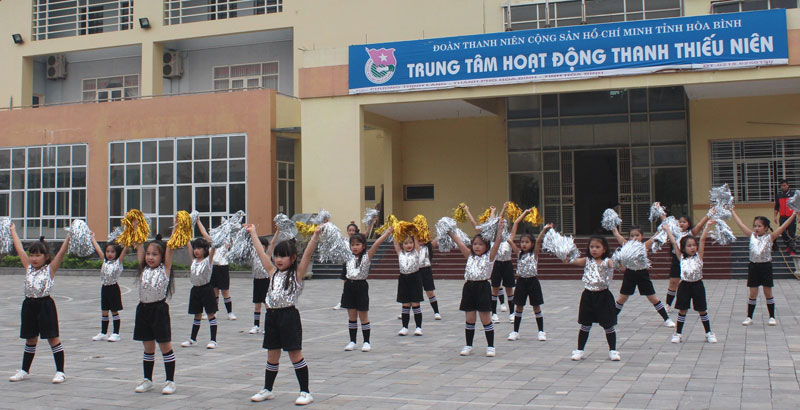
(HBO) - Zumba dance for children is now attracting the active participation of small children. Out of the fifteen clubs and gifted classes, which are being regularly maintained at the Provincial Youth Activity Center, Zumba Kid Club is considered the most outstanding club, creating a healthy and useful playground with great experiences for the children at the age of four to twelve.

Zumba dance performance in the club's picnic activities.
Pham Phuong Nhi, a pupil of class 1A2, Nguyen Tat Thanh high school (Hoa
Binh City) has joined the Zumba Kid club since she was in the 4-year-old
kindergarten class. At that time, the distance from the kindergarten to the
club is very close, so it is suitable for her schedule. Now, it takes more than
30 minutes from Nhi's primary school to the club in the school’s bus if not for
other reasons.
However, she really loves zumba dance, so Mrs. Hung, Nhi's mother has decided to allow her child to attend the club
even though the time and conditions of the transportation are not as convenient
as before. She herself has always been attached to the club's activities for
three years, so she highly appreciates the club experience that has brought to
the children. As a result of this, every Monday, Wednesday and Friday afternoons
in nearly a year, after school, Nhi takes a bus to go straight to the club for
the extracurricular activities that has become her indispensable passion.
like Pham Phuong Nhi, more than thirty other members in Hoa Binh Zumba Club
are very passionate about zumba dance and useful experiences of the Club. In
the relaxing atmosphere and cheerful music background, the small children are
guided to continuous and stretching movements, high jumps, twists, hip shaking,
belly sticks, hand-foot-head
coordination with zumba intensity which are suitable for the children to help
their bodies more supple, faster and more spiritual, after a stressful learning
day.
With an increasingly vibrant and widespread emulation movement aimed at building cultured residential areas and cultured families, Yen Thuy District has been making steady progress toward improving both the material and spiritual well-being of its people, while fostering a civilized, prosperous, beautiful, and progressive community.
Once lacking recreational spaces and community facilities, Residential Group 2 in Quynh Lam Ward (Hoa Binh City) has recently received attention for the construction of a new, spacious, and fully equipped cultural house. The project followed the model of state support combined with public contributions in both labor and funding.
The "All people unite to build cultural life" movement, which has been effectively integrated with Kim Boi district’s socio-economic development goals, is fostering a lively spirit of emulation across local residential areas, hamlets, villages, public agencies, and enterprises. In addition, through the initiative, traditional cultural values are being preserved and promoted, while community solidarity and mutual support in poverty reduction and economic development are being strengthened.
A working delegation of the Hoa Binh provincial People’s Committee led by its Permanent Vice Chairman Nguyen Van Toan on June 11 inspected the progress of a project to build the Mo Muong Cultural Heritage Conservation Space linked to tourism services in Hop Phong commune, Cao Phong district.
Born and growing in the heroic land of Muong Dong, Dinh Thi Kieu Dung, a resident in Bo town of Kim Boi district, in her childhood was nurtured by the sweet lullabies of her grandmother and mother. These melodies deeply imprinted on her soul, becoming an inseparable part of her love for her ethnic group's culture. For over 20 years, this love for her hometown has driven Dung to research, collect, and pass down the cultural values of the Muong people to future generations.
In the final days of May, the Ethnic Art Troupe of Hoa Binh Province organized performances to serve the people in remote, mountainous, and particularly disadvantaged areas within the province. These were not just ordinary artistic shows, but they were the meaningful journeys aimed at spreading cultural values, enhancing the spiritual life of the people and contributing to the preservation of ethnic minority cultural identities.



